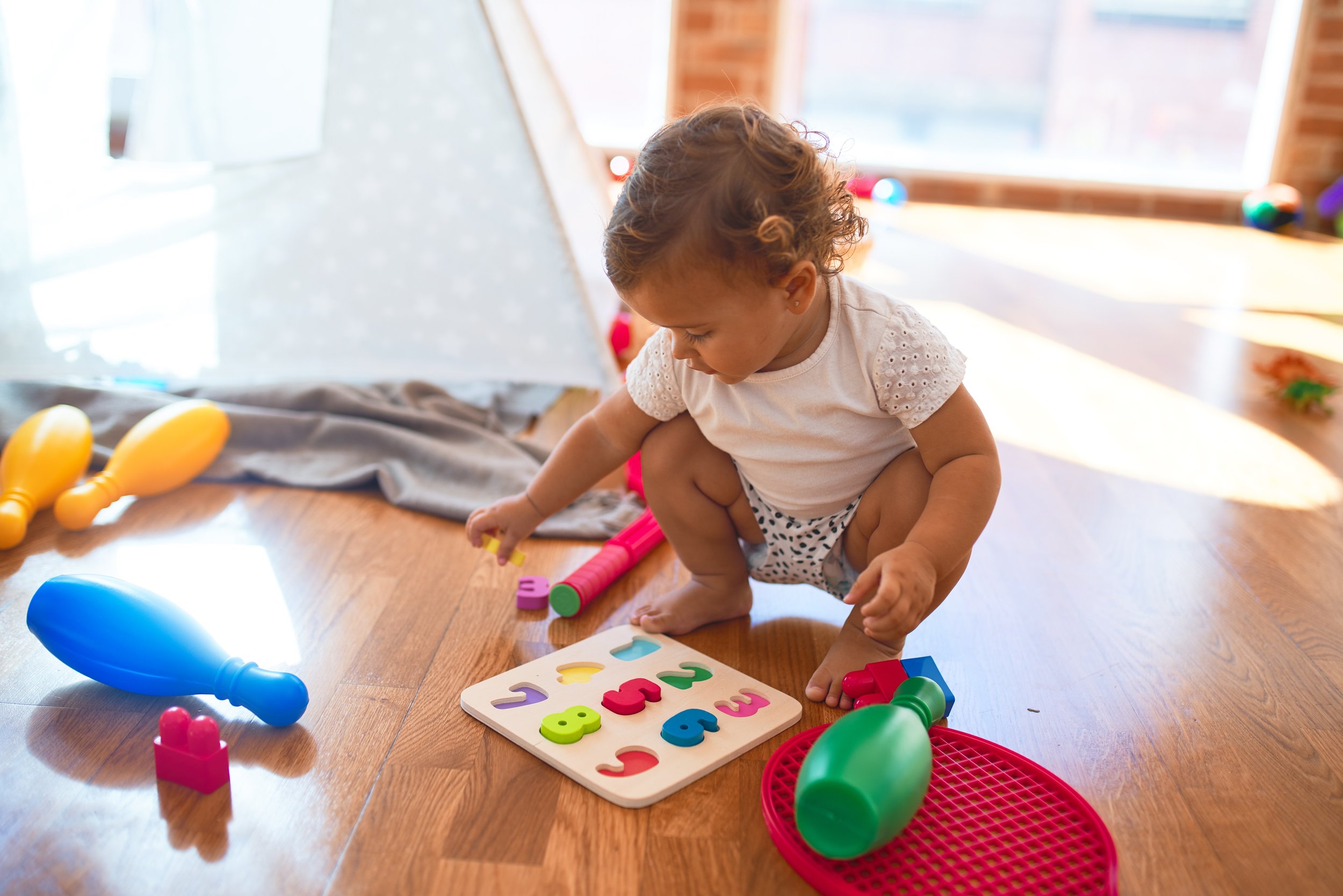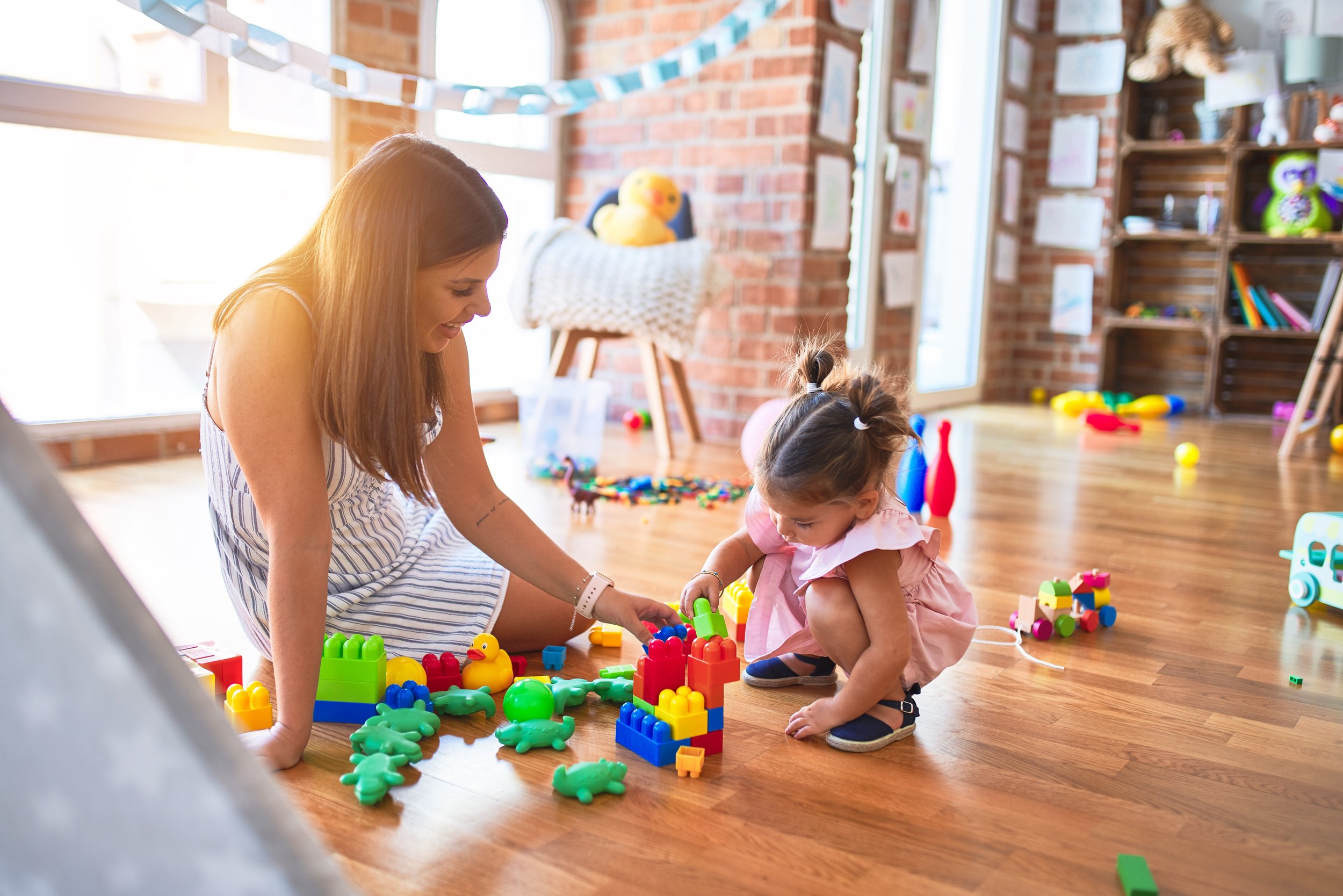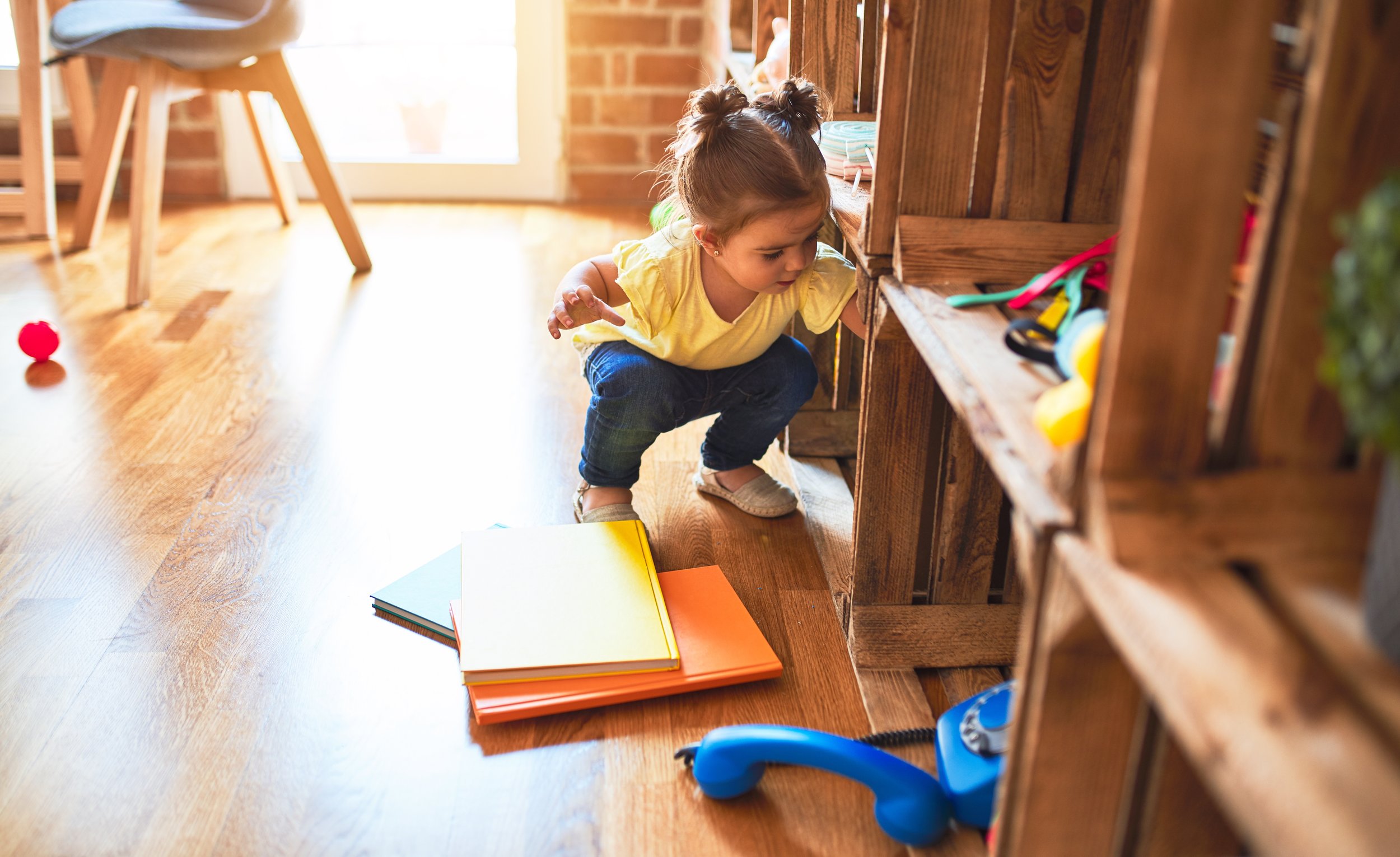When to start speech therapy for toddlers?
You may be wondering, “What’s the best age for speech therapy?”
The quick answer is “Whenever you notice your child may be falling behind. But it’s also never too late!”
You may be considering speech therapy for your toddler or even wondering when to start speech therapy. And I want you to know you’re not alone. The idea of adding another appointment to your already busy schedule can be daunting.
In this post I will explain why getting started early in speech therapy is best and can actually save you time in the long run. Plus, I’ll show you how doable toddler speech therapy can be.
When to start speech therapy & why now is the best time
Babies’ and toddler’s brains are developing and learning at a rate faster than any other time in life!
Did you know that a child’s brain develops to roughly 80% of its adult size by 3 years old?! That’s why babies can learn so many new things in the span of a week and they change noticeably from month to month.
If you are wondering when to start speech therapy, toddlerhood is the best time to start speech therapy because you are able to take advantage of this natural period of rapid brain development.
Children under the age of three often make the fastest progress in speech therapy; and there are a few reasons why:
It’s easier to boost their skills when the gap is small.
It’s easier to learn a skill the “right way” at first. It takes more time to unlearn the “wrong way,” then also have to learn the “right way” of doing something.
Boosting skills early on can help avoid frustration when kids can’t say what they want to. This is important because it’s harder to learn when you are frustrated.
Why you don’t want to ”Wait and See”
Let’s think about the risk/reward analysis for speech therapy.
There is really no risk in having a speech and language evaluation for your child. You will either be recommended or speech therapy or after a close look at your child’s communication development the pediatric speech therapist may tell you they are on track.
There is however a big risk in the “Wait and See” approach because we don’t know for sure if any child is going to catch up on their own; and often the longer you wait, the longer it will take to catch up.
I have worked with so many parents who are frustrated because they waited to get started in speech therapy, and I’m confident they’d tell you to “Just do it!”. Sometimes they waited because their pediatrician recommended “waiting to see if they catch up on their own” and other times they weren’t ready to learn that their sweet baby was behind in their development (it’s not easy to hear!).
As we talked about already, there are many reasons starting speech therapy now is best. And I think they are so important I’ll share them again.
Young children’s brains are growing rapidly and you can take advantage of this critical developmental time by starting early.
Boosting children’s skills when the gap is small is much easier than waiting until the gap has grown larger. Starting speech therapy early can save you time in the long run by reducing the amount of speech therapy you need.
There’s no risk in having a speech and language evaluation to take a comprehensive look at your child’s communication development. If they are on track you have spent an hour of time with the pediatric speech therapist in exchange for peace of mind. If a delay is identified, the speech therapist will come up with a plan to fit your child’s individual needs..
It’s never too late to start! If you’ve been looking for the time or the courage to schedule the appointment, I am cheering you on! Pediatric speech therapists are great cheerleaders, and also super kind, friendly, and compassionate people. We can help you find ways to practice speech and language at home that work for YOU.
What’s the best age for speech therapy?
So to review, the best time to get started in speech therapy for toddlers is as soon as you notice a delay or a missed milestone.
There is no minimum age for speech therapy. Pediatric speech therapists work with babies from the day their are born until their 18th birthday, so it’s never too late!
If you’re on the fence wondering if your child could benefit from seeing a pediatric speech therapist, keep reading!
I’m going to teach you all about toddler speech milestones, how they are decided, and how you can use them to think about your child’s individual development. Plus I will explain how speech therapy supports toddlers in meeting their milestones and how to know if it’s time for your toddler to start with speech therapy.
Toddler Milestones
I have mixed emotions about milestones, and you might feel the same way too. But, they are a great tool for knowing when to start speech therapy for toddlers.
Milestones are our system of checks and balances as pediatric speech therapists; and most speech therapy assessments use milestones to investigate a child’s development compared to their peers. It’s how we know when to start speech therapy for toddlers and give them some extra support in their development of speech and language skills.
How parents can use toddler milestones
Milestones are a great way for parents to see how their child is developing for their age compared to hundreds and thousands of other children their same age. It is so easy to compare your little one to their friend or cousin who is the same age but already talking in sentences. Every child has their own developmental pathway; that’s why there is such a huge range in what is “expected” and understanding the milestones for your child’s age is helpful.
But, you don’t think about milestones all the time. This can leave you feeling pretty discouraged and down if your child is consistently behind. Milestones are great for identifying delays, choosing the next skill to teach a child, and measuring progress periodically. In the in-between times it’s best (and more fun) to celebrate where your child is at and the little wins along the way.
How are milestones decided?
I’m sure you’re familiar with the list of skills and age combinations you get when you search, “Toddler Milestones.” And maybe you’ve wondered Who decides these milestones? or Where did they come from?
Put simply, milestones come from research.
There is variability in milestones depending on where you look because the researchers are using different criteria. For example, one researcher may be looking at the age when 75% of children have said their first word and another may be looking at the age 90% of children have said their first word. There is also variability depending on the group of children researchers studied, when the study was conducted, and the methods they used to do their research.
It can be really frustrating to find different milestones and know which ones to follow. I’ve taken the best available information to create Communication Milestones Checklists for toddlers of different ages. You can download them for free by following the links below.
Finding the support of a pediatric speech therapist
As you already learned, the best time. to start speech therapy for toddlers is as soon as you or your child’s pediatrician notice a delay.
To get started in speech therapy, you will first need a speech and language evaluation to take a closer look at your child’s development of speech and language skills.
A lot of times pediatricians will refer toddlers for a speech and language evaluation because they haven’t started talking by 18 months. BUT you can actually request an evaluation with a pediatric speech therapist sooner if your toddler isn’t talking because you know the first word by 14 months milestone.
Related: 2 Ways to find a pediatric speech therapist near you
Toddler Speech Therapy Evaluations
Understanding what to expect in a speech therapy evaluation often helps feel less nervous or anxious before hand.
A toddler speech and language is casual, relaxed, and fun, dare I say. A pediatric speech therapist is a pro at playing with a toddler, watching for communication milestones, and talking to you about their communication at home all at the time time.
The pediatric speech therapist who completes your toddler’s evaluation may recommend speech therapy. These are the weekly or bi-weekly appointments where you get to learn new strategies to boost your child’s development and learn doable ideas for incorporating speech practice at home.
Related: What to expect at a toddler speech and language evaluation (in detail)
The Inevitable Speech Therapy Waitlist
Once you’ve decided to pursue a speech and language evaluation, and maybe speech therapy, for your toddler you will most likely be put on a waitlist. And I don’t want you to feel powerless or left to the mercy of the waitlist.
Did you know that the most powerful tool used in speech therapy for toddlers is at home practice? It’s true!
A big part of every speech therapy session will be spent teaching you how to practice at home; that’s because you are your toddler’s best teacher. The speech therapist will work with you to create a plan for at home practice that is doable and fun for you and your child.
Practicing just 10 minutes a day at home with your child can have a bigger impact than speech therapy.
If you want to get started using speech therapy strategies at home and kick start your speech therapy, the Toddler Talk Foundations Course (free) was created just for you! You’ll learn 4 of the most powerful speech therapy strategies for toddlers and trust me when I say you are the perfect person for the job!
Follow this link to learn about my 4 favorite speech therapy strategies to use at home!
You might also enjoy watching some of the YouTube videos I have created to see how I practice speech and language skills at home with toddlers.
I’ve linked a video where I encourage my nephew to imitate my words while we are playing together. You’ll notice that most of the time he doesn’t say anything at all; that doesn’t mean I am doing a bad job. All the time we spend practicing and repeating is getting him ready to do it on his own and when it comes to practice speech and language at home patience is the most important and hardest part!
Watch me practice speech at home on YouTube
Here are some other questions parents also asked about the best time to start speech therapy for toddlers:
When should a toddler start speech therapy?
Toddlers should begin speech therapy as soon as a delay or difficulty is identified; it’s never too late or too early to get started. Starting now can boost their speech and language skills so they can continue meeting their communication milestones.
How do I know my child needs speech therapy?
A speech and language evaluation is a one to two hour appointment with a licensed speech therapist designed to figure out if your child needs speech therapy. The speech therapist will ask you questions and play with your child to investigate their expression (talking), understanding, play, and social skills. The speech therapist will use the information they have collected to determine if your child needs speech therapy.
How do I help my 2 year old with speech therapy?
Practicing 15 minutes each day at home is the best way to help your child practice speech therapy. You will want to keep practicing with the same skill they are learning in speech therapy, because repetition with the same skill is how they learn best.
If your 2 year old isn’t in speech therapy and you are looking to practice at home, check out our free Supporting Speech Delay series on YouTube to get started today!
Written By: Stephanie Keffer, MS CCC-SLP
© 2020-2025. Stephanie Keffer Hatleli, MS CCC-SLP. All Rights Reserved.
The content offered on ToddlerTalk.com is for informational purposes only. Toddler Talk is not engaged in rendering professional advice, whether medical or otherwise, to individual users or their children or families. No content on this site, regardless of date, should ever be used as a substitute for direct medical advice from your doctor, speech language pathologist, or other health professional. By accessing the content on ToddlerTalk.com, you acknowledge and agree that you are accepting the responsibility for your child’s health and well-being. In return for providing you with information related to home speech and language practice, you waive any claims that you or your child may have as a result of utilizing the content on ToddlerTalk.com.








